Analyzing Injustice and its Determining Factors in Coffee Production
VerifiedAdded on 2020/01/28
|7
|2671
|105
Essay
AI Summary
This essay explores the injustices within the coffee industry, analyzing human rights violations and ethical issues at micro, meso, and macro economic levels. It highlights the exploitation of farmers, including low wages, unsafe working conditions, and child labor, exacerbated by intermediaries and a lack of fair trade practices. The essay also discusses environmental destruction caused by coffee cultivation and wasteful packaging. It emphasizes the need for direct farmer-customer interactions and the elimination of intermediaries to improve wages and reduce exploitation. The paper provides an overview of the coffee production process, the challenges faced by farmers, and potential solutions to promote fair trade and ethical practices. It also highlights the exploitation of children in coffee fields, the impact on their education, and the violation of labor laws. The essay concludes by advocating for improved farmer education, direct sales strategies, and contracts ensuring minimum wages to mitigate these injustices.
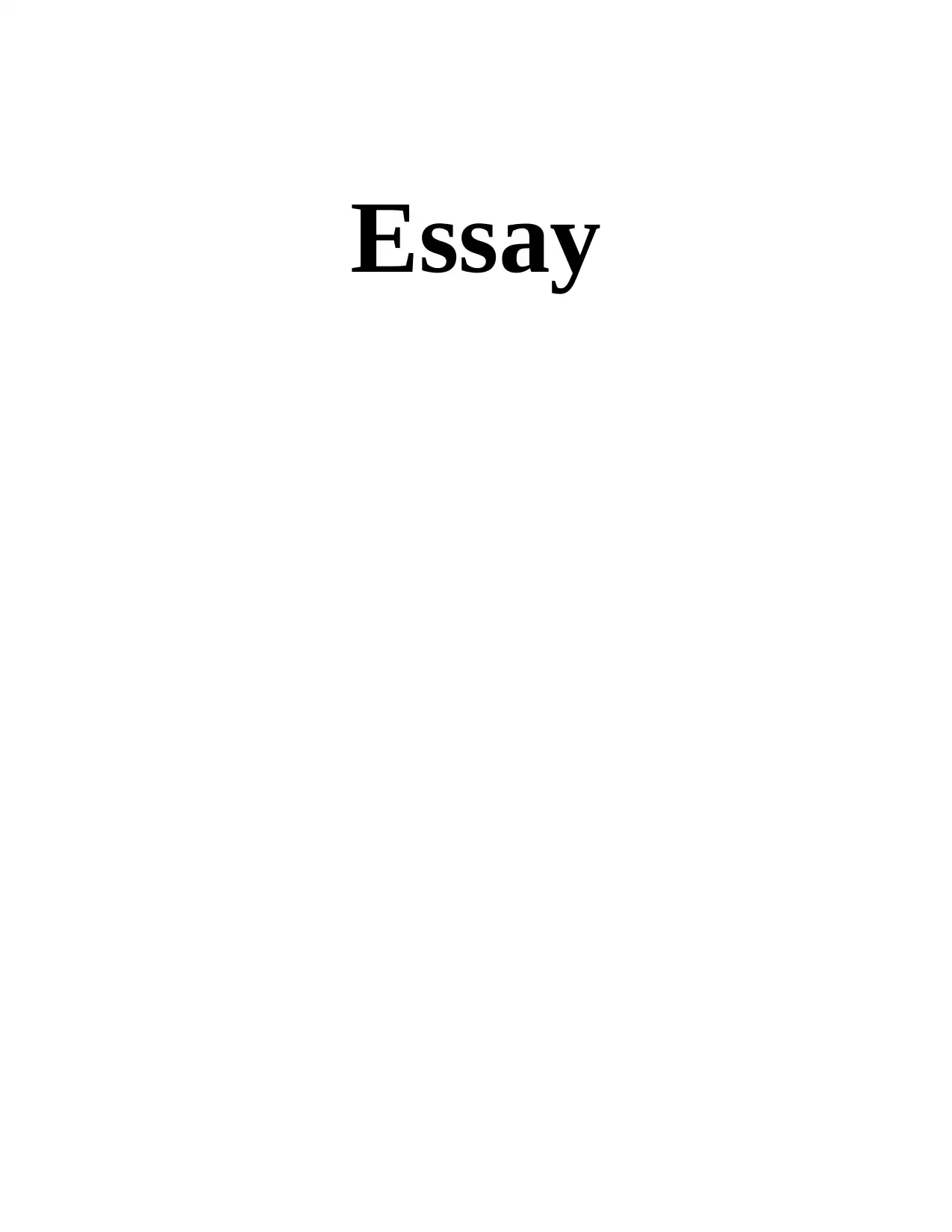
Essay
Paraphrase This Document
Need a fresh take? Get an instant paraphrase of this document with our AI Paraphraser
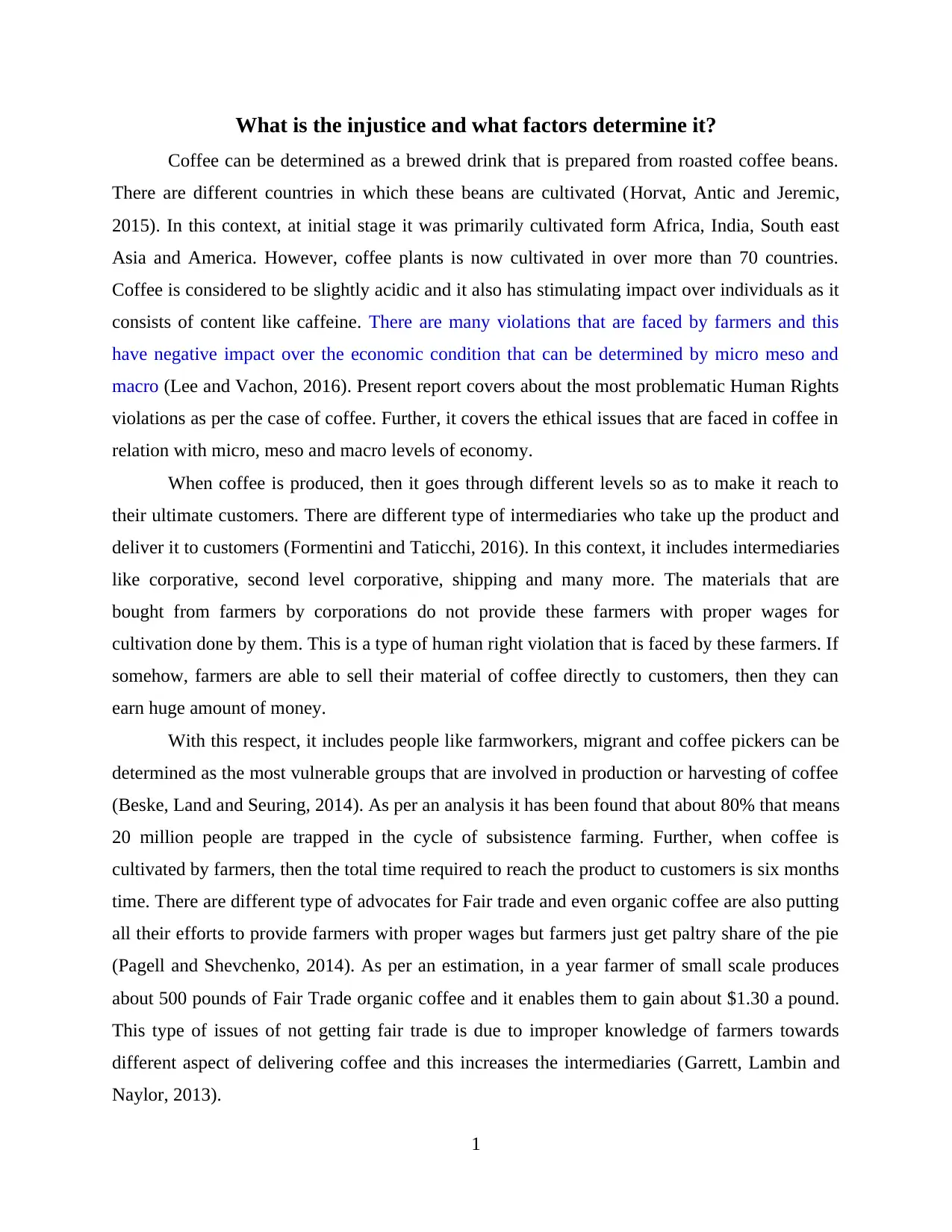
What is the injustice and what factors determine it?
Coffee can be determined as a brewed drink that is prepared from roasted coffee beans.
There are different countries in which these beans are cultivated (Horvat, Antic and Jeremic,
2015). In this context, at initial stage it was primarily cultivated form Africa, India, South east
Asia and America. However, coffee plants is now cultivated in over more than 70 countries.
Coffee is considered to be slightly acidic and it also has stimulating impact over individuals as it
consists of content like caffeine. There are many violations that are faced by farmers and this
have negative impact over the economic condition that can be determined by micro meso and
macro (Lee and Vachon, 2016). Present report covers about the most problematic Human Rights
violations as per the case of coffee. Further, it covers the ethical issues that are faced in coffee in
relation with micro, meso and macro levels of economy.
When coffee is produced, then it goes through different levels so as to make it reach to
their ultimate customers. There are different type of intermediaries who take up the product and
deliver it to customers (Formentini and Taticchi, 2016). In this context, it includes intermediaries
like corporative, second level corporative, shipping and many more. The materials that are
bought from farmers by corporations do not provide these farmers with proper wages for
cultivation done by them. This is a type of human right violation that is faced by these farmers. If
somehow, farmers are able to sell their material of coffee directly to customers, then they can
earn huge amount of money.
With this respect, it includes people like farmworkers, migrant and coffee pickers can be
determined as the most vulnerable groups that are involved in production or harvesting of coffee
(Beske, Land and Seuring, 2014). As per an analysis it has been found that about 80% that means
20 million people are trapped in the cycle of subsistence farming. Further, when coffee is
cultivated by farmers, then the total time required to reach the product to customers is six months
time. There are different type of advocates for Fair trade and even organic coffee are also putting
all their efforts to provide farmers with proper wages but farmers just get paltry share of the pie
(Pagell and Shevchenko, 2014). As per an estimation, in a year farmer of small scale produces
about 500 pounds of Fair Trade organic coffee and it enables them to gain about $1.30 a pound.
This type of issues of not getting fair trade is due to improper knowledge of farmers towards
different aspect of delivering coffee and this increases the intermediaries (Garrett, Lambin and
Naylor, 2013).
1
Coffee can be determined as a brewed drink that is prepared from roasted coffee beans.
There are different countries in which these beans are cultivated (Horvat, Antic and Jeremic,
2015). In this context, at initial stage it was primarily cultivated form Africa, India, South east
Asia and America. However, coffee plants is now cultivated in over more than 70 countries.
Coffee is considered to be slightly acidic and it also has stimulating impact over individuals as it
consists of content like caffeine. There are many violations that are faced by farmers and this
have negative impact over the economic condition that can be determined by micro meso and
macro (Lee and Vachon, 2016). Present report covers about the most problematic Human Rights
violations as per the case of coffee. Further, it covers the ethical issues that are faced in coffee in
relation with micro, meso and macro levels of economy.
When coffee is produced, then it goes through different levels so as to make it reach to
their ultimate customers. There are different type of intermediaries who take up the product and
deliver it to customers (Formentini and Taticchi, 2016). In this context, it includes intermediaries
like corporative, second level corporative, shipping and many more. The materials that are
bought from farmers by corporations do not provide these farmers with proper wages for
cultivation done by them. This is a type of human right violation that is faced by these farmers. If
somehow, farmers are able to sell their material of coffee directly to customers, then they can
earn huge amount of money.
With this respect, it includes people like farmworkers, migrant and coffee pickers can be
determined as the most vulnerable groups that are involved in production or harvesting of coffee
(Beske, Land and Seuring, 2014). As per an analysis it has been found that about 80% that means
20 million people are trapped in the cycle of subsistence farming. Further, when coffee is
cultivated by farmers, then the total time required to reach the product to customers is six months
time. There are different type of advocates for Fair trade and even organic coffee are also putting
all their efforts to provide farmers with proper wages but farmers just get paltry share of the pie
(Pagell and Shevchenko, 2014). As per an estimation, in a year farmer of small scale produces
about 500 pounds of Fair Trade organic coffee and it enables them to gain about $1.30 a pound.
This type of issues of not getting fair trade is due to improper knowledge of farmers towards
different aspect of delivering coffee and this increases the intermediaries (Garrett, Lambin and
Naylor, 2013).
1
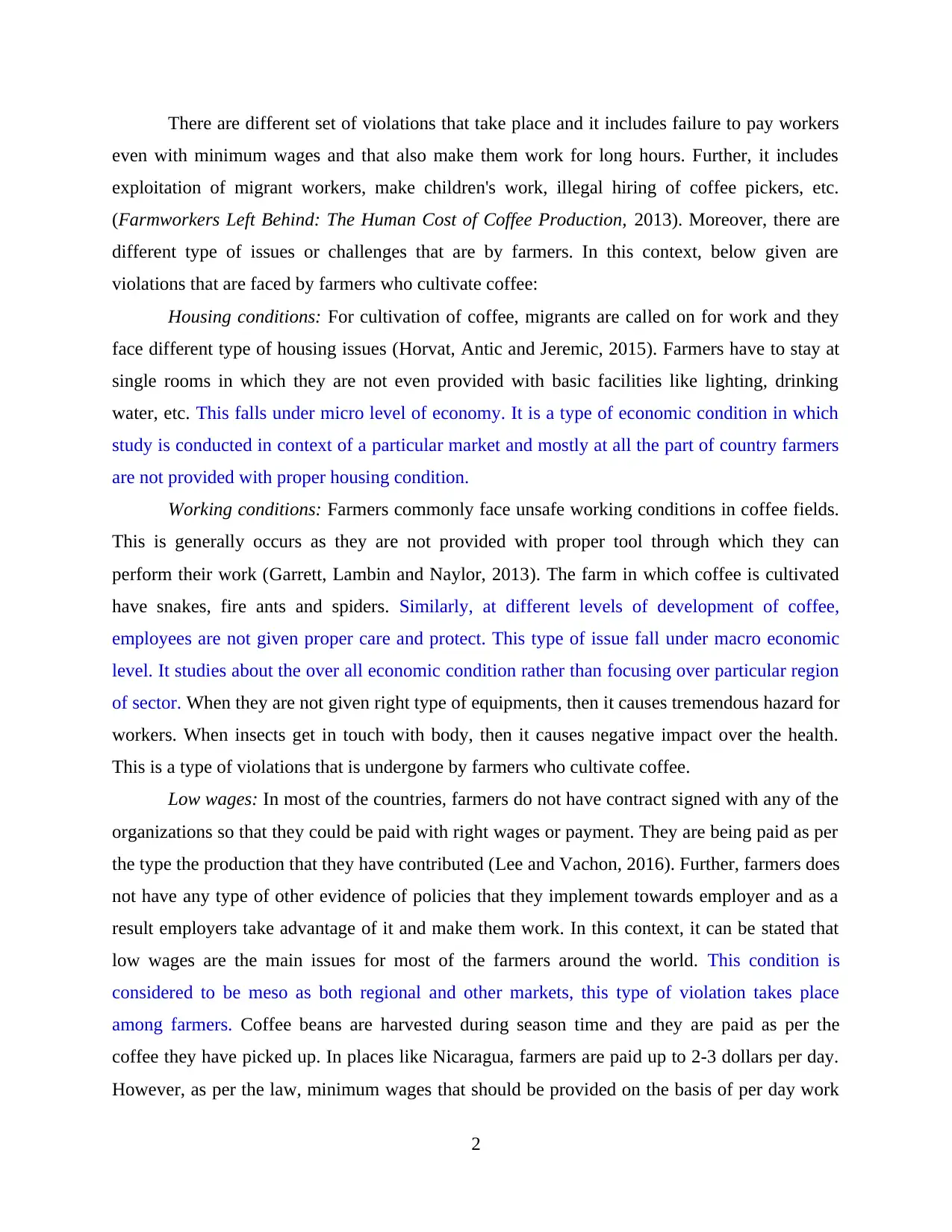
There are different set of violations that take place and it includes failure to pay workers
even with minimum wages and that also make them work for long hours. Further, it includes
exploitation of migrant workers, make children's work, illegal hiring of coffee pickers, etc.
(Farmworkers Left Behind: The Human Cost of Coffee Production, 2013). Moreover, there are
different type of issues or challenges that are by farmers. In this context, below given are
violations that are faced by farmers who cultivate coffee:
Housing conditions: For cultivation of coffee, migrants are called on for work and they
face different type of housing issues (Horvat, Antic and Jeremic, 2015). Farmers have to stay at
single rooms in which they are not even provided with basic facilities like lighting, drinking
water, etc. This falls under micro level of economy. It is a type of economic condition in which
study is conducted in context of a particular market and mostly at all the part of country farmers
are not provided with proper housing condition.
Working conditions: Farmers commonly face unsafe working conditions in coffee fields.
This is generally occurs as they are not provided with proper tool through which they can
perform their work (Garrett, Lambin and Naylor, 2013). The farm in which coffee is cultivated
have snakes, fire ants and spiders. Similarly, at different levels of development of coffee,
employees are not given proper care and protect. This type of issue fall under macro economic
level. It studies about the over all economic condition rather than focusing over particular region
of sector. When they are not given right type of equipments, then it causes tremendous hazard for
workers. When insects get in touch with body, then it causes negative impact over the health.
This is a type of violations that is undergone by farmers who cultivate coffee.
Low wages: In most of the countries, farmers do not have contract signed with any of the
organizations so that they could be paid with right wages or payment. They are being paid as per
the type the production that they have contributed (Lee and Vachon, 2016). Further, farmers does
not have any type of other evidence of policies that they implement towards employer and as a
result employers take advantage of it and make them work. In this context, it can be stated that
low wages are the main issues for most of the farmers around the world. This condition is
considered to be meso as both regional and other markets, this type of violation takes place
among farmers. Coffee beans are harvested during season time and they are paid as per the
coffee they have picked up. In places like Nicaragua, farmers are paid up to 2-3 dollars per day.
However, as per the law, minimum wages that should be provided on the basis of per day work
2
even with minimum wages and that also make them work for long hours. Further, it includes
exploitation of migrant workers, make children's work, illegal hiring of coffee pickers, etc.
(Farmworkers Left Behind: The Human Cost of Coffee Production, 2013). Moreover, there are
different type of issues or challenges that are by farmers. In this context, below given are
violations that are faced by farmers who cultivate coffee:
Housing conditions: For cultivation of coffee, migrants are called on for work and they
face different type of housing issues (Horvat, Antic and Jeremic, 2015). Farmers have to stay at
single rooms in which they are not even provided with basic facilities like lighting, drinking
water, etc. This falls under micro level of economy. It is a type of economic condition in which
study is conducted in context of a particular market and mostly at all the part of country farmers
are not provided with proper housing condition.
Working conditions: Farmers commonly face unsafe working conditions in coffee fields.
This is generally occurs as they are not provided with proper tool through which they can
perform their work (Garrett, Lambin and Naylor, 2013). The farm in which coffee is cultivated
have snakes, fire ants and spiders. Similarly, at different levels of development of coffee,
employees are not given proper care and protect. This type of issue fall under macro economic
level. It studies about the over all economic condition rather than focusing over particular region
of sector. When they are not given right type of equipments, then it causes tremendous hazard for
workers. When insects get in touch with body, then it causes negative impact over the health.
This is a type of violations that is undergone by farmers who cultivate coffee.
Low wages: In most of the countries, farmers do not have contract signed with any of the
organizations so that they could be paid with right wages or payment. They are being paid as per
the type the production that they have contributed (Lee and Vachon, 2016). Further, farmers does
not have any type of other evidence of policies that they implement towards employer and as a
result employers take advantage of it and make them work. In this context, it can be stated that
low wages are the main issues for most of the farmers around the world. This condition is
considered to be meso as both regional and other markets, this type of violation takes place
among farmers. Coffee beans are harvested during season time and they are paid as per the
coffee they have picked up. In places like Nicaragua, farmers are paid up to 2-3 dollars per day.
However, as per the law, minimum wages that should be provided on the basis of per day work
2
⊘ This is a preview!⊘
Do you want full access?
Subscribe today to unlock all pages.

Trusted by 1+ million students worldwide
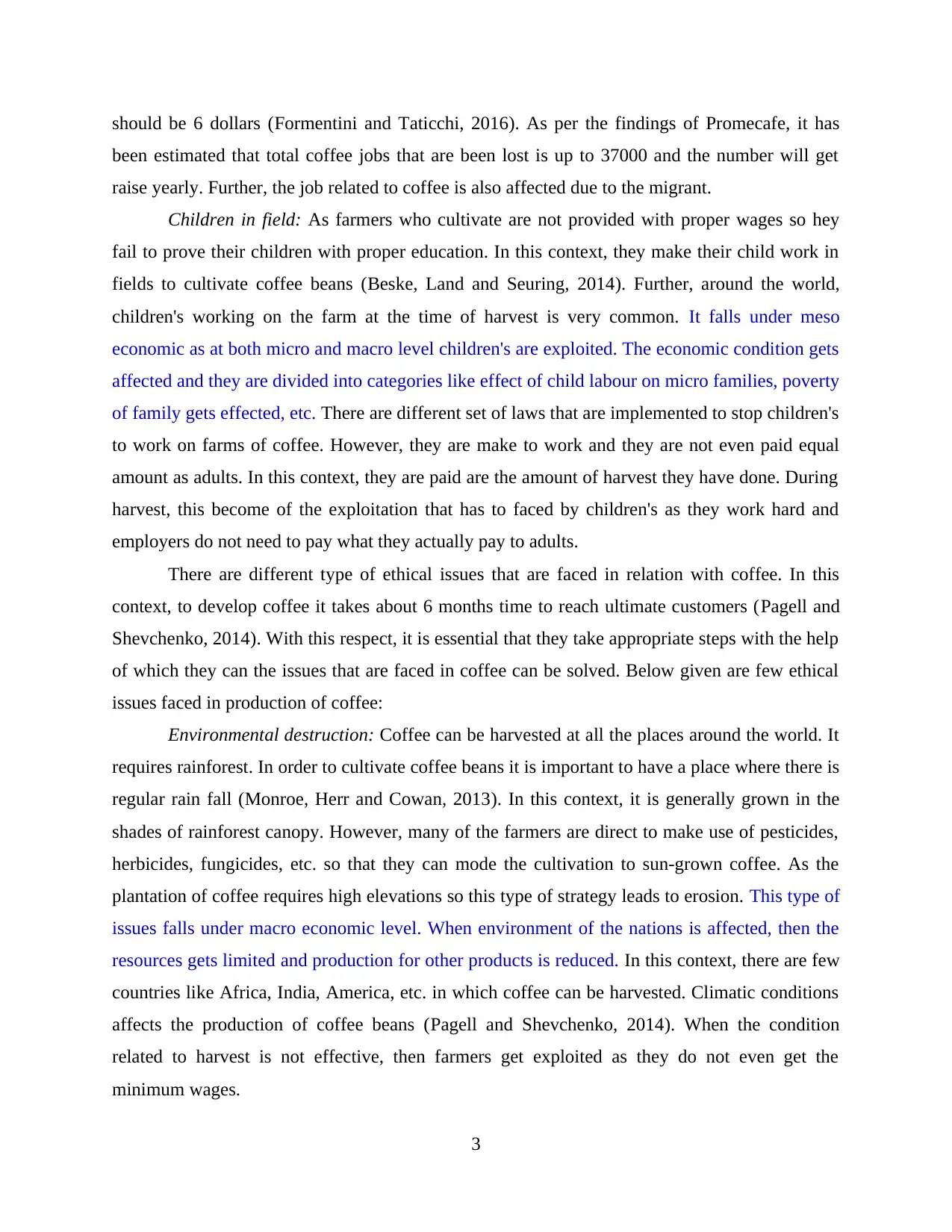
should be 6 dollars (Formentini and Taticchi, 2016). As per the findings of Promecafe, it has
been estimated that total coffee jobs that are been lost is up to 37000 and the number will get
raise yearly. Further, the job related to coffee is also affected due to the migrant.
Children in field: As farmers who cultivate are not provided with proper wages so hey
fail to prove their children with proper education. In this context, they make their child work in
fields to cultivate coffee beans (Beske, Land and Seuring, 2014). Further, around the world,
children's working on the farm at the time of harvest is very common. It falls under meso
economic as at both micro and macro level children's are exploited. The economic condition gets
affected and they are divided into categories like effect of child labour on micro families, poverty
of family gets effected, etc. There are different set of laws that are implemented to stop children's
to work on farms of coffee. However, they are make to work and they are not even paid equal
amount as adults. In this context, they are paid are the amount of harvest they have done. During
harvest, this become of the exploitation that has to faced by children's as they work hard and
employers do not need to pay what they actually pay to adults.
There are different type of ethical issues that are faced in relation with coffee. In this
context, to develop coffee it takes about 6 months time to reach ultimate customers (Pagell and
Shevchenko, 2014). With this respect, it is essential that they take appropriate steps with the help
of which they can the issues that are faced in coffee can be solved. Below given are few ethical
issues faced in production of coffee:
Environmental destruction: Coffee can be harvested at all the places around the world. It
requires rainforest. In order to cultivate coffee beans it is important to have a place where there is
regular rain fall (Monroe, Herr and Cowan, 2013). In this context, it is generally grown in the
shades of rainforest canopy. However, many of the farmers are direct to make use of pesticides,
herbicides, fungicides, etc. so that they can mode the cultivation to sun-grown coffee. As the
plantation of coffee requires high elevations so this type of strategy leads to erosion. This type of
issues falls under macro economic level. When environment of the nations is affected, then the
resources gets limited and production for other products is reduced. In this context, there are few
countries like Africa, India, America, etc. in which coffee can be harvested. Climatic conditions
affects the production of coffee beans (Pagell and Shevchenko, 2014). When the condition
related to harvest is not effective, then farmers get exploited as they do not even get the
minimum wages.
3
been estimated that total coffee jobs that are been lost is up to 37000 and the number will get
raise yearly. Further, the job related to coffee is also affected due to the migrant.
Children in field: As farmers who cultivate are not provided with proper wages so hey
fail to prove their children with proper education. In this context, they make their child work in
fields to cultivate coffee beans (Beske, Land and Seuring, 2014). Further, around the world,
children's working on the farm at the time of harvest is very common. It falls under meso
economic as at both micro and macro level children's are exploited. The economic condition gets
affected and they are divided into categories like effect of child labour on micro families, poverty
of family gets effected, etc. There are different set of laws that are implemented to stop children's
to work on farms of coffee. However, they are make to work and they are not even paid equal
amount as adults. In this context, they are paid are the amount of harvest they have done. During
harvest, this become of the exploitation that has to faced by children's as they work hard and
employers do not need to pay what they actually pay to adults.
There are different type of ethical issues that are faced in relation with coffee. In this
context, to develop coffee it takes about 6 months time to reach ultimate customers (Pagell and
Shevchenko, 2014). With this respect, it is essential that they take appropriate steps with the help
of which they can the issues that are faced in coffee can be solved. Below given are few ethical
issues faced in production of coffee:
Environmental destruction: Coffee can be harvested at all the places around the world. It
requires rainforest. In order to cultivate coffee beans it is important to have a place where there is
regular rain fall (Monroe, Herr and Cowan, 2013). In this context, it is generally grown in the
shades of rainforest canopy. However, many of the farmers are direct to make use of pesticides,
herbicides, fungicides, etc. so that they can mode the cultivation to sun-grown coffee. As the
plantation of coffee requires high elevations so this type of strategy leads to erosion. This type of
issues falls under macro economic level. When environment of the nations is affected, then the
resources gets limited and production for other products is reduced. In this context, there are few
countries like Africa, India, America, etc. in which coffee can be harvested. Climatic conditions
affects the production of coffee beans (Pagell and Shevchenko, 2014). When the condition
related to harvest is not effective, then farmers get exploited as they do not even get the
minimum wages.
3
Paraphrase This Document
Need a fresh take? Get an instant paraphrase of this document with our AI Paraphraser
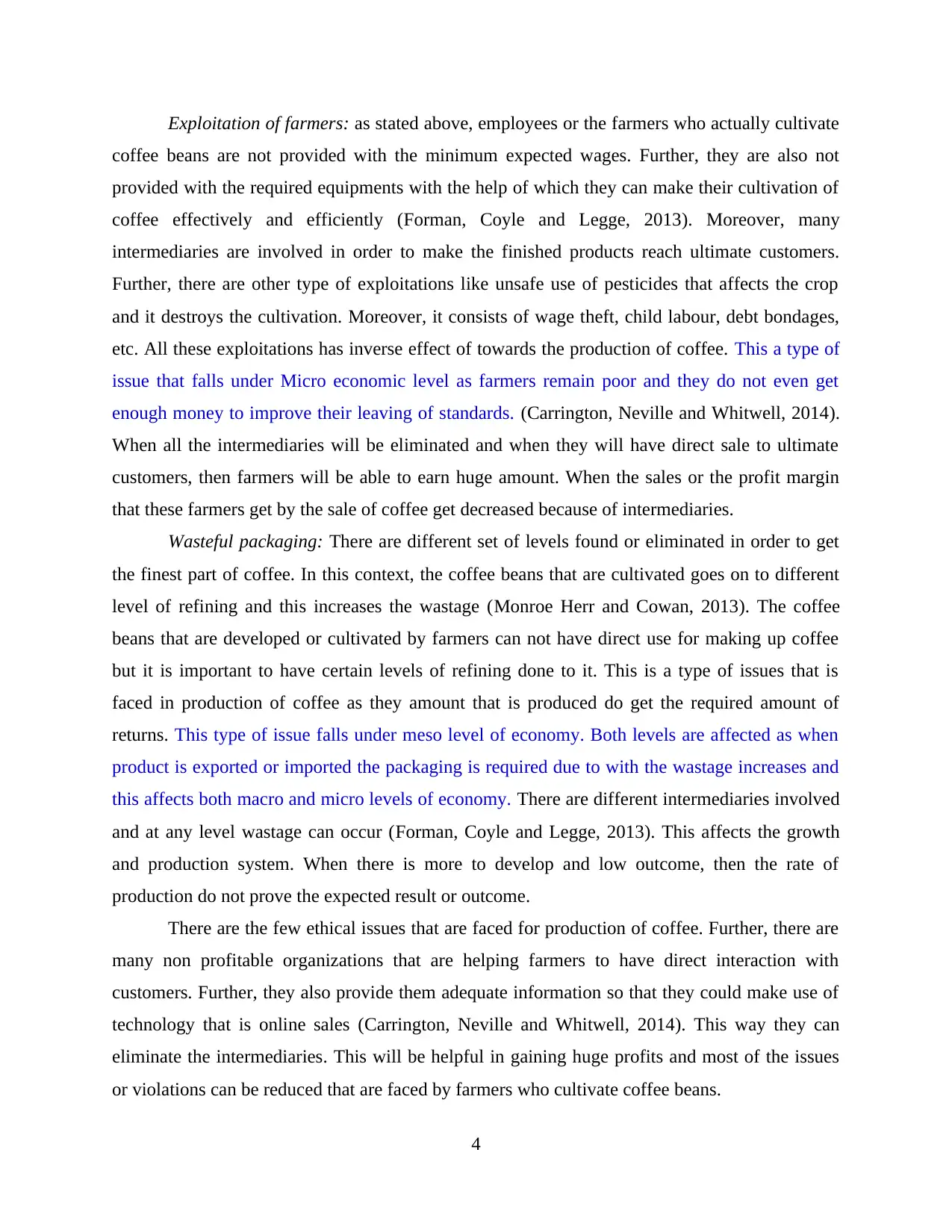
Exploitation of farmers: as stated above, employees or the farmers who actually cultivate
coffee beans are not provided with the minimum expected wages. Further, they are also not
provided with the required equipments with the help of which they can make their cultivation of
coffee effectively and efficiently (Forman, Coyle and Legge, 2013). Moreover, many
intermediaries are involved in order to make the finished products reach ultimate customers.
Further, there are other type of exploitations like unsafe use of pesticides that affects the crop
and it destroys the cultivation. Moreover, it consists of wage theft, child labour, debt bondages,
etc. All these exploitations has inverse effect of towards the production of coffee. This a type of
issue that falls under Micro economic level as farmers remain poor and they do not even get
enough money to improve their leaving of standards. (Carrington, Neville and Whitwell, 2014).
When all the intermediaries will be eliminated and when they will have direct sale to ultimate
customers, then farmers will be able to earn huge amount. When the sales or the profit margin
that these farmers get by the sale of coffee get decreased because of intermediaries.
Wasteful packaging: There are different set of levels found or eliminated in order to get
the finest part of coffee. In this context, the coffee beans that are cultivated goes on to different
level of refining and this increases the wastage (Monroe Herr and Cowan, 2013). The coffee
beans that are developed or cultivated by farmers can not have direct use for making up coffee
but it is important to have certain levels of refining done to it. This is a type of issues that is
faced in production of coffee as they amount that is produced do get the required amount of
returns. This type of issue falls under meso level of economy. Both levels are affected as when
product is exported or imported the packaging is required due to with the wastage increases and
this affects both macro and micro levels of economy. There are different intermediaries involved
and at any level wastage can occur (Forman, Coyle and Legge, 2013). This affects the growth
and production system. When there is more to develop and low outcome, then the rate of
production do not prove the expected result or outcome.
There are the few ethical issues that are faced for production of coffee. Further, there are
many non profitable organizations that are helping farmers to have direct interaction with
customers. Further, they also provide them adequate information so that they could make use of
technology that is online sales (Carrington, Neville and Whitwell, 2014). This way they can
eliminate the intermediaries. This will be helpful in gaining huge profits and most of the issues
or violations can be reduced that are faced by farmers who cultivate coffee beans.
4
coffee beans are not provided with the minimum expected wages. Further, they are also not
provided with the required equipments with the help of which they can make their cultivation of
coffee effectively and efficiently (Forman, Coyle and Legge, 2013). Moreover, many
intermediaries are involved in order to make the finished products reach ultimate customers.
Further, there are other type of exploitations like unsafe use of pesticides that affects the crop
and it destroys the cultivation. Moreover, it consists of wage theft, child labour, debt bondages,
etc. All these exploitations has inverse effect of towards the production of coffee. This a type of
issue that falls under Micro economic level as farmers remain poor and they do not even get
enough money to improve their leaving of standards. (Carrington, Neville and Whitwell, 2014).
When all the intermediaries will be eliminated and when they will have direct sale to ultimate
customers, then farmers will be able to earn huge amount. When the sales or the profit margin
that these farmers get by the sale of coffee get decreased because of intermediaries.
Wasteful packaging: There are different set of levels found or eliminated in order to get
the finest part of coffee. In this context, the coffee beans that are cultivated goes on to different
level of refining and this increases the wastage (Monroe Herr and Cowan, 2013). The coffee
beans that are developed or cultivated by farmers can not have direct use for making up coffee
but it is important to have certain levels of refining done to it. This is a type of issues that is
faced in production of coffee as they amount that is produced do get the required amount of
returns. This type of issue falls under meso level of economy. Both levels are affected as when
product is exported or imported the packaging is required due to with the wastage increases and
this affects both macro and micro levels of economy. There are different intermediaries involved
and at any level wastage can occur (Forman, Coyle and Legge, 2013). This affects the growth
and production system. When there is more to develop and low outcome, then the rate of
production do not prove the expected result or outcome.
There are the few ethical issues that are faced for production of coffee. Further, there are
many non profitable organizations that are helping farmers to have direct interaction with
customers. Further, they also provide them adequate information so that they could make use of
technology that is online sales (Carrington, Neville and Whitwell, 2014). This way they can
eliminate the intermediaries. This will be helpful in gaining huge profits and most of the issues
or violations can be reduced that are faced by farmers who cultivate coffee beans.
4
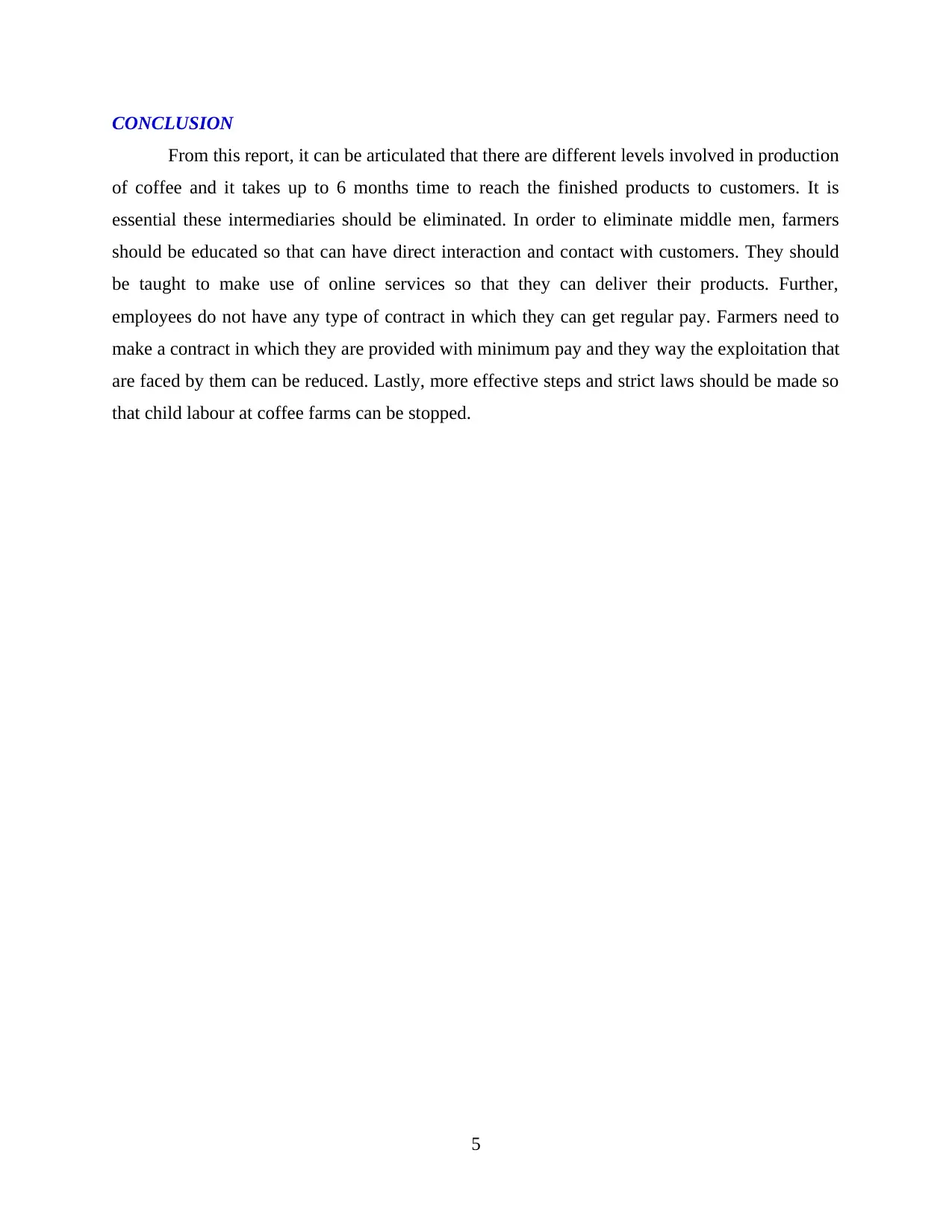
CONCLUSION
From this report, it can be articulated that there are different levels involved in production
of coffee and it takes up to 6 months time to reach the finished products to customers. It is
essential these intermediaries should be eliminated. In order to eliminate middle men, farmers
should be educated so that can have direct interaction and contact with customers. They should
be taught to make use of online services so that they can deliver their products. Further,
employees do not have any type of contract in which they can get regular pay. Farmers need to
make a contract in which they are provided with minimum pay and they way the exploitation that
are faced by them can be reduced. Lastly, more effective steps and strict laws should be made so
that child labour at coffee farms can be stopped.
5
From this report, it can be articulated that there are different levels involved in production
of coffee and it takes up to 6 months time to reach the finished products to customers. It is
essential these intermediaries should be eliminated. In order to eliminate middle men, farmers
should be educated so that can have direct interaction and contact with customers. They should
be taught to make use of online services so that they can deliver their products. Further,
employees do not have any type of contract in which they can get regular pay. Farmers need to
make a contract in which they are provided with minimum pay and they way the exploitation that
are faced by them can be reduced. Lastly, more effective steps and strict laws should be made so
that child labour at coffee farms can be stopped.
5
⊘ This is a preview!⊘
Do you want full access?
Subscribe today to unlock all pages.

Trusted by 1+ million students worldwide
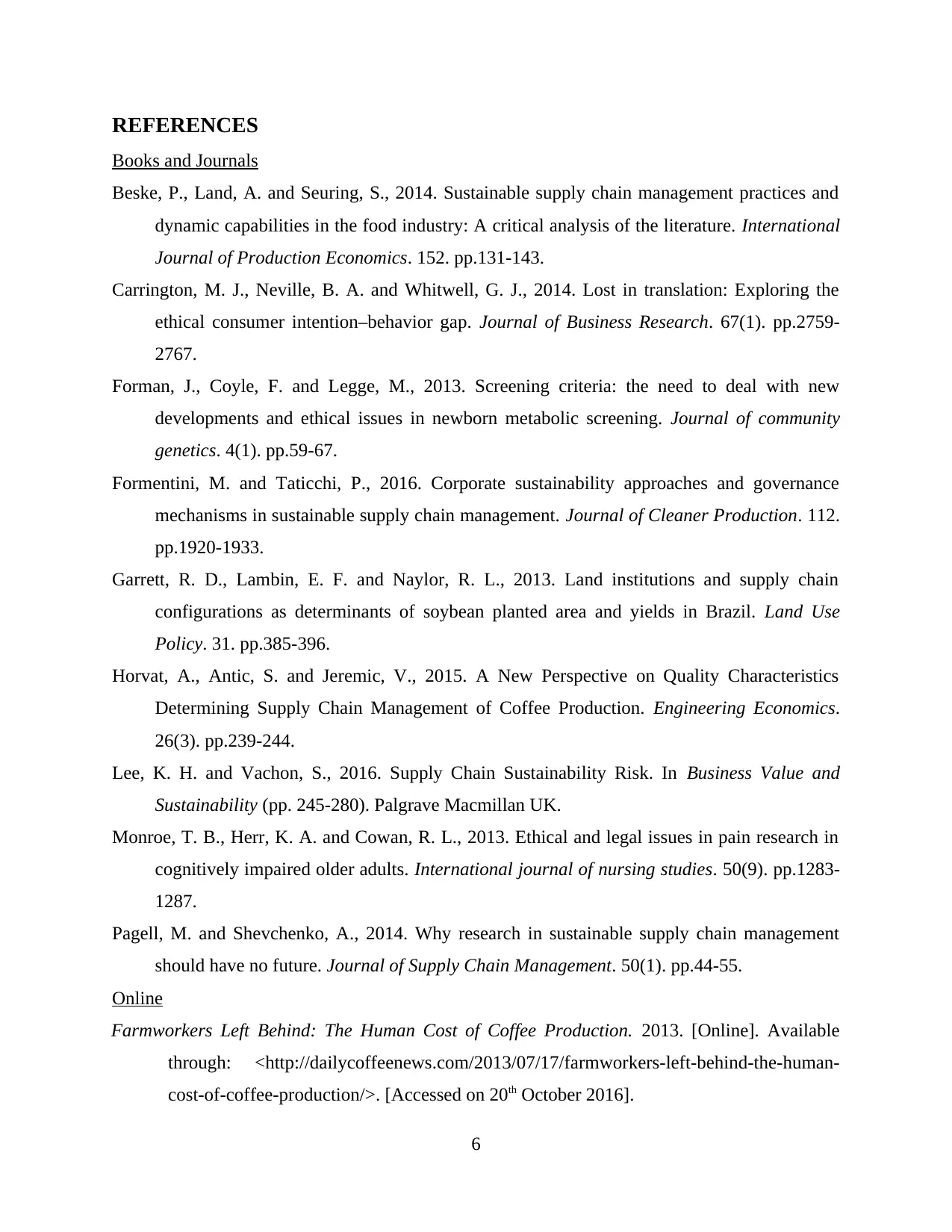
REFERENCES
Books and Journals
Beske, P., Land, A. and Seuring, S., 2014. Sustainable supply chain management practices and
dynamic capabilities in the food industry: A critical analysis of the literature. International
Journal of Production Economics. 152. pp.131-143.
Carrington, M. J., Neville, B. A. and Whitwell, G. J., 2014. Lost in translation: Exploring the
ethical consumer intention–behavior gap. Journal of Business Research. 67(1). pp.2759-
2767.
Forman, J., Coyle, F. and Legge, M., 2013. Screening criteria: the need to deal with new
developments and ethical issues in newborn metabolic screening. Journal of community
genetics. 4(1). pp.59-67.
Formentini, M. and Taticchi, P., 2016. Corporate sustainability approaches and governance
mechanisms in sustainable supply chain management. Journal of Cleaner Production. 112.
pp.1920-1933.
Garrett, R. D., Lambin, E. F. and Naylor, R. L., 2013. Land institutions and supply chain
configurations as determinants of soybean planted area and yields in Brazil. Land Use
Policy. 31. pp.385-396.
Horvat, A., Antic, S. and Jeremic, V., 2015. A New Perspective on Quality Characteristics
Determining Supply Chain Management of Coffee Production. Engineering Economics.
26(3). pp.239-244.
Lee, K. H. and Vachon, S., 2016. Supply Chain Sustainability Risk. In Business Value and
Sustainability (pp. 245-280). Palgrave Macmillan UK.
Monroe, T. B., Herr, K. A. and Cowan, R. L., 2013. Ethical and legal issues in pain research in
cognitively impaired older adults. International journal of nursing studies. 50(9). pp.1283-
1287.
Pagell, M. and Shevchenko, A., 2014. Why research in sustainable supply chain management
should have no future. Journal of Supply Chain Management. 50(1). pp.44-55.
Online
Farmworkers Left Behind: The Human Cost of Coffee Production. 2013. [Online]. Available
through: <http://dailycoffeenews.com/2013/07/17/farmworkers-left-behind-the-human-
cost-of-coffee-production/>. [Accessed on 20th October 2016].
6
Books and Journals
Beske, P., Land, A. and Seuring, S., 2014. Sustainable supply chain management practices and
dynamic capabilities in the food industry: A critical analysis of the literature. International
Journal of Production Economics. 152. pp.131-143.
Carrington, M. J., Neville, B. A. and Whitwell, G. J., 2014. Lost in translation: Exploring the
ethical consumer intention–behavior gap. Journal of Business Research. 67(1). pp.2759-
2767.
Forman, J., Coyle, F. and Legge, M., 2013. Screening criteria: the need to deal with new
developments and ethical issues in newborn metabolic screening. Journal of community
genetics. 4(1). pp.59-67.
Formentini, M. and Taticchi, P., 2016. Corporate sustainability approaches and governance
mechanisms in sustainable supply chain management. Journal of Cleaner Production. 112.
pp.1920-1933.
Garrett, R. D., Lambin, E. F. and Naylor, R. L., 2013. Land institutions and supply chain
configurations as determinants of soybean planted area and yields in Brazil. Land Use
Policy. 31. pp.385-396.
Horvat, A., Antic, S. and Jeremic, V., 2015. A New Perspective on Quality Characteristics
Determining Supply Chain Management of Coffee Production. Engineering Economics.
26(3). pp.239-244.
Lee, K. H. and Vachon, S., 2016. Supply Chain Sustainability Risk. In Business Value and
Sustainability (pp. 245-280). Palgrave Macmillan UK.
Monroe, T. B., Herr, K. A. and Cowan, R. L., 2013. Ethical and legal issues in pain research in
cognitively impaired older adults. International journal of nursing studies. 50(9). pp.1283-
1287.
Pagell, M. and Shevchenko, A., 2014. Why research in sustainable supply chain management
should have no future. Journal of Supply Chain Management. 50(1). pp.44-55.
Online
Farmworkers Left Behind: The Human Cost of Coffee Production. 2013. [Online]. Available
through: <http://dailycoffeenews.com/2013/07/17/farmworkers-left-behind-the-human-
cost-of-coffee-production/>. [Accessed on 20th October 2016].
6
1 out of 7
Your All-in-One AI-Powered Toolkit for Academic Success.
+13062052269
info@desklib.com
Available 24*7 on WhatsApp / Email
![[object Object]](/_next/static/media/star-bottom.7253800d.svg)
Unlock your academic potential
Copyright © 2020–2026 A2Z Services. All Rights Reserved. Developed and managed by ZUCOL.